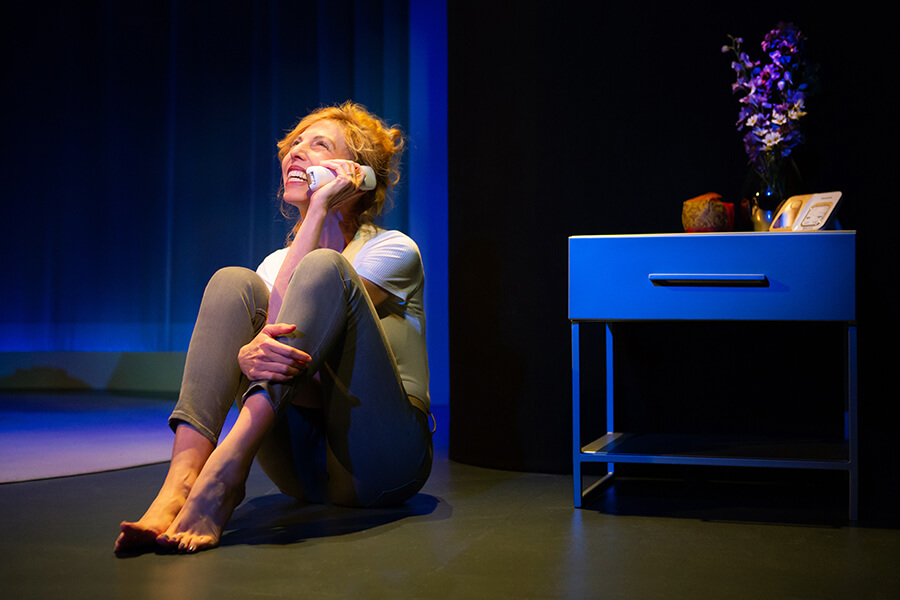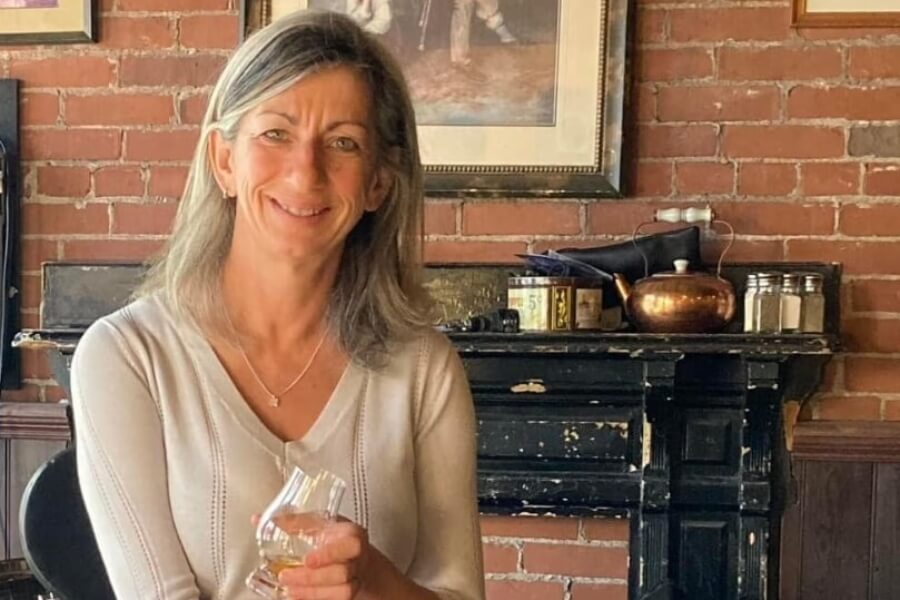“This is not what my life was supposed to look like,” Maddie Corman, writer and star of her one-woman off-Broadway play, Accidentally Brave, insisted.
I would guess that many in the audience have had this feeling at some time in their own lives, partly accounting for the play’s success. Although few have faced the kind of bombshell that detonated in Corman’s happy life, we identify with her as she tells it.
Her play begins with this slight woman sitting on an almost bare stage, waif-like in bare feet, a simple little white T-shirt and jeans, and a sweater she wraps around her from time to time when she needs to use it as a hug. You immediately want to put your arms around her and make all the bad go away. Especially when you hear her shocking story.
This is not a play about how she was okay, then not okay, then okay again “I am NOT okay,” she says emphatically before she tells us how “it” all began almost four years ago.
The Nightmare Begins

Photo: Jeremy Daniel
At 5:00 a.m. on her way to work as a “well-known-ish” actor, she picked up her cell phone to hear her sobbing 16-year-old daughter say, “The police are here, and they’re taking Daddy!” In addition to her husband, the police took his computer. And then Corman first learned what the man she had been married to for almost two decades had done.
‘The police are here, and they’re taking Daddy!’ her 16-year-old daughter cried.
Conscious that their sex life had dwindled a bit, she wondered whether he might be having an affair. But she dismissed that thought. After all, they were both busy people and he was her “best person,” the loving husband and father of their three children, school soccer coach, successful TV director. What he had done never crossed her mind: He had been caught watching, downloading, and sharing images of children engaging in sexual acts.
How could she not have known? you ask. It had never even occurred to her. Who thinks such a thing about the man you thought you knew so well? Eventually tried and convicted, he had to register as a sex offender and stay away from children—which meant that the family could never again host trick-or-treaters or go anywhere in their small town without feeling stared at and whispered about.
Read More: How An Article About Extreme Plastic Surgery Turned Into the Hit TV Show Younger
A New, Awful Normal

Photo: Jeremy Daniel
The play conveys the public humiliation and private suffering Corman endured while coming to grips with her “new normal.” “It’s about,” she told me on the phone, “what happens in between—in between the time a trauma happens and the time you get up off the floor.
“In our society,” she continued, “there seems to be almost a rule that something happens and then you go away and you come back and we don’t talk about it. Nobody talks about when you’re down on the bathroom floor sobbing and throwing up. It’s such a lonely time. This is what I wanted to talk about.”
Nobody talks about when you’re down on the bathroom floor sobbing and throwing up. It’s such a lonely time.
And talk she does. She talks about the headlines and TV reports blaring forth in their suburban Westchester town, about how even if they would have wanted to keep their family’s trauma secret they could not have, about how hard it was to do the simplest things in daily life—like going out in public, just to the supermarket. She talks about the hurtful things that well-meaning people say, like “I can’t imagine …” “Things like that made me feel even lonelier than I already was,” she told me.
Of the helpful things people said, she cited the woman who called her one day and became her mysterious “angel,” seeing her through the darkest times. She also expressed gratitude for offers like “Let me do your grocery shopping for you,” “I’m coming over to teach you a yoga class,” “Here’s a plant,” or just asking, “How can I be a friend to you?” When I told her that one critic described the play as a 90-minute therapy session, she said, “If that’s what it is, I should charge more for tickets.” Funny. As are many moments in the play despite its underlying sadness.
Moving Past Shame

Photo: Jeremy Daniel
Onstage, Corman talks about the effect of the trauma on her, not on its impact on her husband: “That’s his story to tell.” The only thing she said about him was that she learned that certain things had happened to him when he was young, a secret he had kept even from his therapist of many years.
She touched only minimally on how it has affected her children—her daughter, who, at the time, was about to go into high school, and her twin sons, who were about to go into middle school. Of course, she tried to protect them as much as possible, one motivation for moving from their suburban house to live in Harlem. The other was financial: between her husband’s losing his job and the bills from lawyers, therapists, and the expensive rehab, they couldn’t afford to continue living in the only house her kids had ever known.
I asked her how her children feel about her doing this excruciatingly intimate play. “I can’t speak for them—they’re three different people with all different feelings, which seem to be a mix of annoyance, fear, shame.” She had discussed the play with them ahead of time—and now it has gotten more attention than any of them anticipated. “We’re trying to live our life in our family so there won’t be shame. We couldn’t have kept it secret if we had wanted to—the only one who did try to keep secrets was my husband. The play is my version of our story.”
The Stay-or-Leave Question

Photo: Jeremy Daniel
Onstage, she talks about the therapy everyone in the family has received and about her husband’s 45-day stay at a rehab in Arizona, where she visited during “Family Week” and found herself going someplace she didn’t want to go to see someone she didn’t want to see. On finding him tanned and glowing, Corman said, “I didn’t know if I wanted to hug him or punch him in the face.”
She learned that porn can be as addicting as crystal meth and that addicts are sick rather than evil.
But she did stay with him—something she wasn’t sure she would be able to do, something others question, she knows. Eventually, through her assignments in rehab and her reading and her own therapy, she learned that porn can be as addicting as crystal meth and that addicts are sick rather than evil. She is, for now, feeling the need to give him the chance to be cured.
She talked about her own family meetings with her children on dealing with their “new normal.” So far, her children don’t want to see the play. “And that’s fine,” she said. “They know that if they ever want to see it, fine. But right now they’re teenagers and they’re concerned with what’s going on in their lives.”
Read More: Dr. Ruth Finally Admits She’s a Feminist In Her New Documentary
Laughing Through the Pain

Photo: Jeremy Daniel
When I saw Corman’s performance, the audience was not only crying but also laughing. As Daryl Roth, the play’s producer, says, “Maddie is an actress first and foremost, and a comedic actress. Her great gift is the ability to tell her story with a glint of humor and lightness that goes through it—aside from the darkness.” Maddie’s daughter appreciates humor too: as she told her mother, “When something bad happens that doesn’t mean you stop being funny.”
When something bad happens that doesn’t mean you stop being funny.
Corman’s own mother died young, when Corman was only 16, and she told me “I miss her. I missed her on the great days, like when my children were born and when she was happy for me when I was on stage, and now I miss just her knowing what I’m thinking and feeling and being able to cuddle up and have her stroke my hair.”
Roth, 74, whose productions have garnered some 100 awards, including seven Pulitzer Prizes and 10 Tony’s, has focused on strong women, and she, as well as Corman and her director and friend Kristin Hanggi, see this story as a way of being of service to women. But not only to women. “I see this play,” Roth told me, “as helping audiences to understand why and how people make choices in their lives and understanding how different people may make different choices. I hear people talking in the lobby and asking, ‘How can she still be married to him?’ I think they then ask themselves, ‘What would I do?’”
The reviews have been well over 90 percent enthusiastic, and the play will be at the intimate DR2 Theatre in New York through June 30th. For tickets, go to www.accidentallybrave.com.




















0 Comments